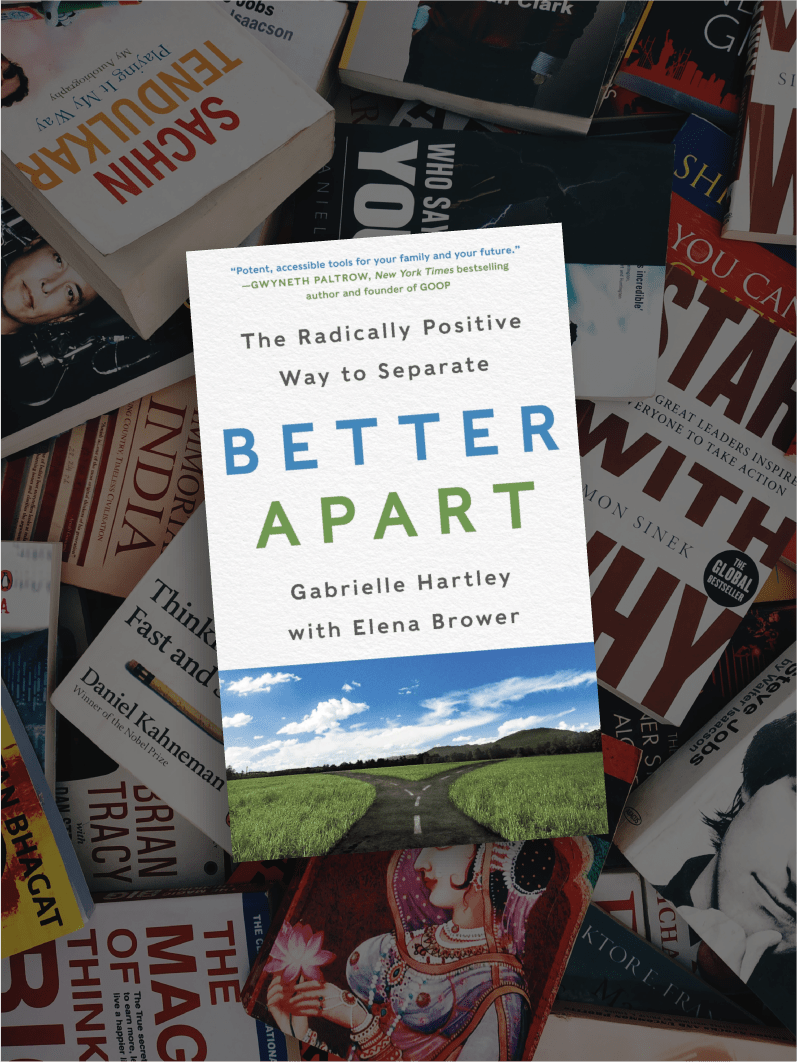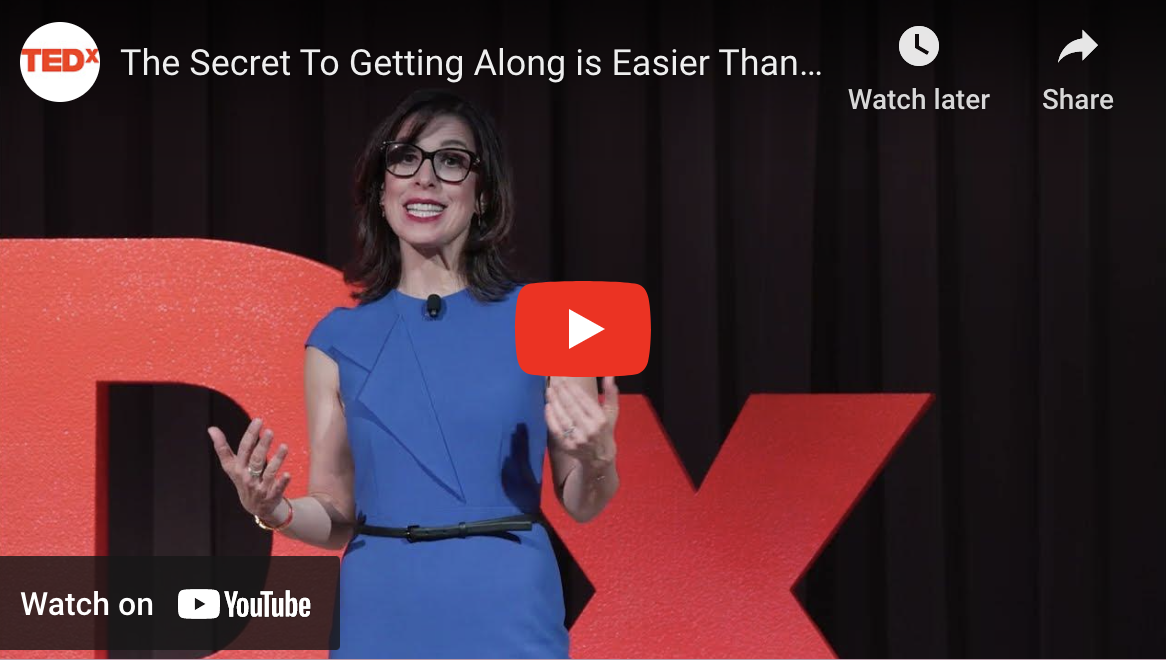Better Apart; The Radically Positive Way to Separate was written by divorce lawyer and top online mediator, Gabrielle Hartley to help people get through their difficult break ups without losing their mind.
Gabrielle was recently a podcast guest At Rich in Relationship. One area we work in is helping people create win/win scenarios with their toxic and/or narcissistic spouse. I was thrilled to learn more about Gabrielle’s Better Apart Method which impacts the work we do directly. This method has five steps, or tools, that are central in reducing the time we spend triggered in divorce, as well as keeping our eye on the prize of our children’s well being.
What’s the Better Apart Method?
Gabrielle explained that she wanted to create something that was a way for people to have tools to feel strong, whole, and grounded through the divorce process (no matter how ugly it feels at the moment). This is the basis for a “good” divorce.
The Better Apart® Method can apply to any kind or stage of divorce. It can even help post divorce. This super easy five step protocol is your sure way to a better (even less expensive) divorce!
1- Patience
The first step is all about taking a step back, not getting sucked into the fight. It’s about managing our triggers so that we don’t go from 0-60 and lose sight of what really matters. Typically this involves using tools like breathing exercises, mindfulness, and prayer. It might involve taking a break to reset.
Trigger management is a vital tool in life, but especially when separating ourselves from someone we loved and now, may feel betrayed by.
Gabrielle calls this “learning to be responsive rather than reactive”. I love this frame! When we are reactive we are shooting from the hip at anything that moves and we may (and often do ) live to regret it. When we are responsive, we are thinking, perhaps even empathetic and so better able to craft a win/win environment.
2- Respect
The second step focuses on setting boundaries.
It’s not just about respecting others (which is very important), but first and foremost, respecting yourself. Setting boundaries is a proven technique for creating greater safety for ourselves and therefore respecting our own feelings and need for sanctuary in the storm of divorce.
This is especially true if the person you are divorcing is less than respectful with you. Setting a boundary is a way to limit your exposure to their negativity. Getting that they are not bad people, but simply going through their own feelings and that you actually have little to do with their choosing is central.

3- Peace
Can you really have peace in the middle of a divorce? As Gabrielle says, this is not about rainbows, fairies and unicorns. It’s really about recognizing the neutral. It’s about noticing the map.
When we’re in a good enough place, that’s where we can start growing and moving forward. In divorce, this is verbally articulating when things are okay!
We have minds that are glue for negatives and teflon for positives. People need to hear about 8 to 12 positives for every negative and if you want to move forward, you really need to be focusing on what’s good.
This is taking your mind away from whatever negative track you or your partner may have taken and redirecting it to your previous victories. This is simple but not always easy and you may need some outside help with this.
4- Clarity
Clarity is about getting clear!
No, but seriously, hear me out. As Gabrielle says, it’s about “separating wants and needs”. It’s getting clear on where you are setting your boundaries, how you are responding and reacting.
A need is something necessary to living. A want is something helpful but not vital. Separating needs from wants will make a huge difference in every part of the divorce negotiation.
There is an interactive method, you learn to see WHY you want (or need) things.
“I want the house!” All right, but what are the reasons for this? Maybe the house has a special meaning for you (want), maybe it means a stable place to live (need), maybe you just don’t want to be seen as a loser (want). Whatever it is!
Most of the time, once you´re clear about WHY you are taking the position that you are, the thing itself becomes less important. You can begin to focus on how to fulfill the want or the need that might be separate from the object of negotiation.
5- Forgiveness
“Holding on to anger is like drinking poison and expecting the other person to die!”.
I bet you´ve met many people who´ve been holding on to anger for years. They´re still angry about something that happened in their lives, about someone doing them wrong. Without noticing, this became their internal narrative. As part of their internal narrative, it also takes emotional energy to maintain, and takes away from other areas of your life. It can even color the way you see your daily experience.
Learning how to forgive will show you how you´ve got agency and power over your internal dialogue, over that very narrative. You CAN change it, even if it’s one step (or story) at a time.
Changing your “story” about a past situation from anger and blame by coming from a place of empathy and learning from the experience will free up mental and emotional energy for the rest of your life!
Why Is This Method So Important?
Because divorce is massively triggering for both parties, there is a tendency to see one another as narcissistic. That is because when we are really triggered we ARE thinking mostly of ourselves, our own safety and future.
In some cases the person on the other side is narcissistic even when they are not triggered. Even these scenarios can be turned into wins however.
What makes the Better Apart Method effective is it helps you to get past those survival feelings and thoughts and create strategies that can work.
Anyways, this was but a quick summary of our wonderful podcast episode, so remember, go listen to it! You´ll get tons of more value out of it.

I was born into a family that was an ongoing “armageddon”. To me, conflict, dishonesty, and confrontation were the norm. There were hints that my home was far from normal. Once I got out into the world on my own, the differences were glaringly obvious. That’s when my personal journey really began.
I got help from professionals. Engaged in self-help groups. Explored the world of spiritual practices. I got married saying I would NEVER get divorced. Then I got divorced. Fortunately, I had someone to coach me through that process who really understood the emotional traps. I managed to avoid going to war, learned to manage my triggers, and the divorce was relatively amicable and quick as a result.
My purpose is to help families of all kinds end the fight and build a more resilient future. I have faith that there is always a way and that confidence bleeds into everything I do.
I´ve been there myself, that situation that for some reason you think can´t change but, deep down, want to change. In case you want to know more about what we do at Rich in Relationship, go visit our website!
Some links and posts are from our sponsors. Here’s how it works.
P.S. Want more tools and resources to stay positive during a divorce? Download my Free Divorce Survive & Thrive Kit below!


BETTER APART
The Radically Positive Way to Separate
Gabrielle Hartley with Elena Brower
Available on Amazon
“Potent, accessible tools for your family and your future.”
— Gwyneth Paltrow, New York Times Bestselling Author and Founder of GOOP

FOLLOW GABRIELLE

DISCLAIMER: The commentary, advice, and opinions from Gabrielle Hartley are for informational purposes only and not for the purpose of providing legal advice or mental health services. You should contact an attorney and/or mental health professional in your state to obtain advice with respect to any particular issue or problem.
- One Edgewater Plaza Suite 304, Staten Island, NY 10305
- 266 Smith Street, Brooklyn, NY 11231
Northampton MA
PHONE:
New York: (917) 905-4553
Boston: (413) 450-0420


